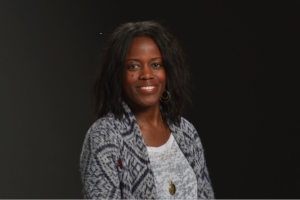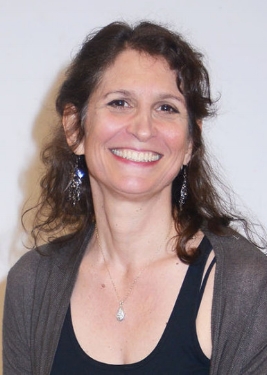On November 2, an audience of playwrights engaged in a lively and free-wheeling discussion of “What Makes a Great Play about Science?” with an expert panel of scientists and playwrights at this year’s EST/Sloan Artist Cultivation Event....
Physicist Brian Greene, Biochemist Mandë Holford, and Playwrights Lucas Hnath and Deb Laufer join Science Editor Steve Mirsky for the November 2 EST/Sloan Artist Cultivation Event
From left: Brian Greene, Mandë Holford, Lucas Hnath, Deb Laufer, Steve Mirsky
WHAT COULD MAKE A GREAT PLAY ABOUT SCIENCE?
“To stimulate artists to create credible and compelling work exploring the worlds of science and technology and to challenge the existing stereotypes of scientists and engineers in the popular imagination.”—this has been the mission of The Ensemble Studio Theatre/Alfred P. Sloan Foundation Science & Technology Project (EST/Sloan Project, for short) for the past 19 years. Over that time the EST/Sloan Project has awarded more than $3 million in grants to some 300 playwrights and theatre companies. More than 150 productions of EST/Sloan-developed plays have been mounted nationwide. (You can view previous commission recipients on the EST/Sloan web page and submission guidelines here).
Every year the highlight of the EST/Sloan Project submission season (September 1 to December 1) is the Fall Artist Cultivation Event. At this eagerly anticipated event, a panel of scientists, science writers and playwrights engages in a far-ranging and free-wheeling discussion with an audience of prospective playwrights about “what could make a great play about science?” The 2016 Fall Artist Cultivation Event will take place at EST on Thursday, November 2 at 7 PM. The event is free and any playwright interested in developing a play about science or technology is welcome to attend.
Two related events culminate each EST/Sloan season: 1) The First Light Festival is a month-long series of readings and workshops that showcase plays in development, and 2) a full mainstage production of at least one work. Recent mainstage productions have included SPILL (2017) by Leigh Fondakowski on the Deepwater Horizon disaster, Boy (2016) by Anna Ziegler on sexual identity, Please Continue (2016) by Frank Basloe on Stanley Milgram’s obedience experiments, Informed Consent (2015) by Deborah Zoe Laufer on scientific research and Alzheimer’s, Fast Company (2014) by Carla Ching on game theory and confidence games, Isaac’s Eye (2013) by Lukas Hnath on scientific method and rivalry, and Headstrong (2012) by Patrick Link on sports and concussions.
This year's Artist Cultivation Event panelists:
Brian Greene (Photo: Lark Elliott/Vintage Books)
Brian Greene is an American theoretical physicist, mathematician, and string theorist, renowned for his groundbreaking discoveries in superstring theory, including the co-discovery of mirror symmetry and of spatial topology change. He has been a professor at Columbia University since 1996, chairman of the World Science Festival since co-founding it with producer Tracy Day in 2008, and is Director of Columbia University’s Center for Theoretical Physics. He is known to the public through his books, The Elegant Universe, The Fabric of the Cosmos, and The Hidden Reality, which have collectively spent 65 weeks on the New York Times bestseller list and sold more than 2 million copies worldwide. The Washington Post has called him “the single best explainer of abstruse concepts in the world today.” Professor Greene hosted two Peabody and Emmy Award winning NOVA miniseries based on his books and is a frequent television guest, joining Stephen Colbert seven times and playing himself in an episode of The Big Bang Theory. He has also had cameo roles in a number of Hollywood films including Frequency, Maze and The Last Mimzy.
Mandë Holford (Photo © D. Finnin/AMNH2015)
Chemical biologist Mandë Holford is an Associate Professor in Chemistry at Hunter College and CUNY-Graduate Center, with scientific appointments at the American Museum of Natural History and Weill Cornell Medical College. Her joint appointments reflect her interdisciplinary research, which goes from mollusks to medicine, combining chemistry and biology to discover, characterize, and deliver novel peptides from venomous marine snails as tools for manipulating cellular physiology in pain and cancer. She has received several awards, including being named a New Champion Young Scientist by the World Economic Forum in 2014, the prestigious Camille Dreyfus Teacher-Scholar Award, an NSF CAREER Award, and named a 21st Century Chemist in the NBC-Learn, Chemistry Now series. Dr. Holford is actively involved in science education, advancing the public understanding of science, and science diplomacy. She is co-founder of Killer Snails, a learning games company that uses extreme creatures, like venomous marine snails, as a conduit to advance scientific learning on a global scale. She is also co-founder of RAISE-W (Resource Assisted Initiatives in Science Empowerment for Women), an NSF project to increase the number of women in science. Dr. Holford co-developed a premier Science Diplomacy course at The Rockefeller University to encourage early career scientists to think globally about the impact of their research as it pertains to international relations.
Lucas Hnath (Photo:Tony Cenicola/The New York Times)
Playwright Lucas Hnath is the author of Isaac’s Eye, which EST produced as the 2012 EST/Sloan Mainstage Production and which won the 2012 Whitfield Cook Award. More recently, Lucas wrote A Doll’s House, Part 2, which had its world premiere on Broadway on April 27 of this year and closed September 24 after 30 previews and 173 regular performances at the Golden Theatre. With the original cast featuring Laurie Metcalf, Chris Cooper, Jayne Houdyshell and Condola Rashad, the play garnered eight TONY nominations—the most of any play in the 2016-2017 season—and a Best Actress win for Metcalf as Nora. Lucas’s other plays include A Public Reading of an Unproduced Screenplay About the Death of Walt Disney, The Christians (which won the 2016 Outer Critics Circle Award for Outstanding New Off Broadway Play and a 2016 Playwriting Obie), and Red Speedo, which also won a 2016 Playwriting Obie. Lucas has been a resident playwright at New Dramatists since 2011 and is Assistant Professor in the Department of Dramatic Writing at New York University’s Tisch School of the Arts.
Deborah Zoe Laufer (Photo: Monica Simoes)
Playwright Deborah Zoe Laufer is the author of Informed Consent, which EST co-produced as the 2015 EST/Sloan Mainstage Production with Primary Stages at The Duke on 42nd Street to much critical and popular acclaim. In 2017 Informed Consent had productions at the Lantern Theatre in Philadelphia; the Apollinaire Theatre in Chelsea, MA; the American Stage in St. Petersburg, FL; and the GableStage in Coral Gables, FL; and will be produced in March, 2018 at the Unicorn Theatre in Kansas City, MO. Deb is also the author of End Days (EST/Sloan 2009 Mainstage Production and awarded The ATCA Steinberg citation). End Days received a rolling work premiere through the National New Play Network, and went on to receive over 60 productions after that. Her other plays include Be Here Now, Leveling Up, Sirens, Out of Sterno, The Last Schwartz, Meta, The Three Sisters of Weehawken, Fortune, The Gulf of Westchester, Miniatures, and Random Acts. Deb has received the Helen Merrill Playwriting Award and the Lilly Award.
About the moderator
Steve Mirsky
Writer and editor Steve Mirsky has written the “Anti Gravity” column for Scientific American since 1995 and is a member of the magazine’s board of editors. Mirsky launched Scientific American ’s interview-format Science Talk podcast in 2006 and has been hosting it ever since. He also created the daily 60-Second Science podcast, which has also been running since 2006 and has been nominated for a Webby Award. He has contributed to numerous publications and broadcast outlets, including Audubon; Wildlife Conservation; National Wildlife; Earth; Longevity; The Humanist; Men’s Fitness; American Health; Technology Review; the Howard Hughes Medical Institute Bulletin; Astronomy; New York Newsday; Sea Frontiers; the children’s magazines Current Science, Science World and Muse; National Public Radio; and the Medical News Network.









